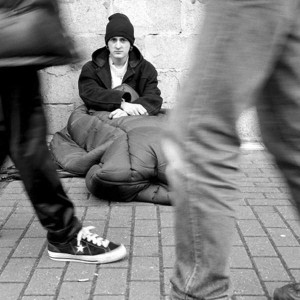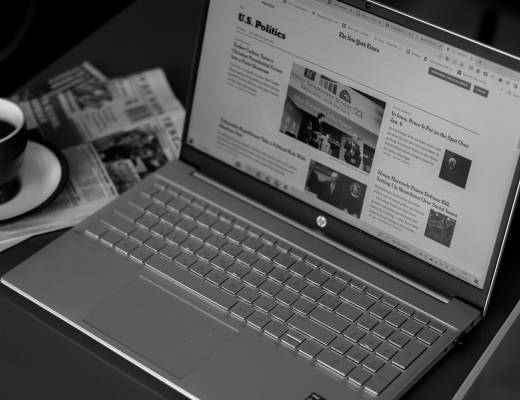 For those of us who live in the Northern Hemisphere, the winter chill has descended.
Thick winter jackets, scarves, thermals and boots are on. Retail competition is at its highest and capitalism is at it’s crowning moment, with agenda-driven economists and politicians disagreeing on key economic indicators such as consumer confidence and inflation.
The very fortunate ones with cash or credit power have locked in trips to international and domestic ski resorts, while sun chasers are jetting southerly to islands, cities and continents scattered across warmer latitudes. The fortunate ones will be at home, living the financial realities of Europe’s and America’s recessionary times, paying debts, accumulating a bit more but enjoying a reflective and humble holiday season.
The unfortunate ones though, will be homeless.
This article is dedicated to entrepreneurs at the edge of homelessness, those deep within its cradle, those rebuilding their new post-homeless lives and the wider international
For those of us who live in the Northern Hemisphere, the winter chill has descended.
Thick winter jackets, scarves, thermals and boots are on. Retail competition is at its highest and capitalism is at it’s crowning moment, with agenda-driven economists and politicians disagreeing on key economic indicators such as consumer confidence and inflation.
The very fortunate ones with cash or credit power have locked in trips to international and domestic ski resorts, while sun chasers are jetting southerly to islands, cities and continents scattered across warmer latitudes. The fortunate ones will be at home, living the financial realities of Europe’s and America’s recessionary times, paying debts, accumulating a bit more but enjoying a reflective and humble holiday season.
The unfortunate ones though, will be homeless.
This article is dedicated to entrepreneurs at the edge of homelessness, those deep within its cradle, those rebuilding their new post-homeless lives and the wider international 1. Bernard Groves, San Francisco, United States.
After losing his job in 2006 at a beverage company, Bernard Groves and his partner of 13 years, who mothered his three children, separated. Failing to secure employment, Groves plunged into homelessness five months afterwards. Without a home, car and only a backpack, Groves slept at parks and regularly caught the train from Fremont to Richmond in the San Francisco Bay Area, to get sleep. During the day, Groves would occupy the city’s libraries for internet access where he discovered the Small Business Development Center and learned networking skills, gained new inspiration and nurtured his business idea of creating low-cost diapers and toys. After living dangerously on the streets, Groves took refuge at a San Jose homeless shelter called EHC LifeBuilders. There he met Robert Faison, another homeless man and former manufacturing engineer. Gaining the support of the Small Business Center, EHC LifeBuilders, the church’s pastor who gathered seed money and an attorney who incorporated their startup, Groves and Faison successfully established a business supplying stores in the San Francisco Bay area with low-cost diapers. The business has just turned a profit and Groves now lives in a rented home.2. The Sanchez Family, San Diego, United States.
With their father imprisoned, their family business bankrupt and their disabled mother unable to work, the Sanchez children had to grow up – fast. Staying at a homeless shelter in San Diego and then the Monarch School – America’s largest school for homeless children, their futures changed under the generous mentorship of John Rosicky, a local volunteer. Rosicky engaged them with an entrepreneurial idea to establish a bicycle messenger and courier service delivering letters, documents, dry-cleaning, takeaway food and parcels across San Diego. Investing in bicycles, bags and shirts for the children, Speedy Sanchez Delivery was established, charging customers a flat rate of $10 for all deliveries with the exception of filing legal documents in court, which carry an additional $5 fee. Today, Abraham, Laura and Ruth Sanchez continue cycling their way into a promising future while living in a small apartment with their mother and sharing collective dreams for college educations. If you live or operate a business in San Diego, please support the Sanchez children.3. Nathan Murphy, Sydney, Australia.
Across the Pacific Ocean in Sydney, teenager Nathan Murphy lived a troubled relationship with his parents. Forced to leave home, Murphy lived on the streets traveling to Melbourne and Darwin, sleeping on cardboard boxes and dumpster-diving for food. Connecting with the Salvation Army, Nathan was offered a crisis bed. Sharing his entrepreneurial aspirations, the Salvation Army channeled his ambitions into meaningful programs which led to the establishment of AudioHighSchool .
AudioHighSchool was born from Nathan’s insight that most teenagers carried iPods in addition to heavy textbooks. The company merges education and entertainment with audio lessons so students can learn on-the-go while traveling, exercising or relaxing. Today, Murphy lives in a studio while developing his business under the guidance and trainee-ship of Richard Branson’s Virgin Money.
The stories of Bernard Groves, The Sanchez children and Nathan Murphy share common threads.
They are not romanticized historical references to icons who experienced homelessness such as KFC’s Colonel Harland Sanders.
They are not awe-commanding homeless to billionaire stories like John Paul Jones DeJoria, the former homeless entrepreneur now valued at $4 billion through his hair product company, John Paul Mitchell Systems.
They are not celebrated in film, like Chris Gardner’s life, the CEO of stock-brokerage firm Gardner Rich & Co. who was winningly portrayed by Will Smith in The Pursuit Of Happiness.
They are not homeless-to-celebrity biographies starring Halle Berry, Hillary Swank, David Letterman, Shania Twain and James Bond’s Daniel Craig.
Nor are they media and publicity-driven zero-to-hero individuals seeking to sell sensationalized truths with book sales, press releases and speaker tours.
There is a humbling authenticity to the stories of Bernard Groves, The Sanchez Children and Nathan Murphy. Their endings are unwritten, they are works-in-progress and there is a realness that smells of our modern urban lives; unnerving but equally relatable, relevant and inspiring.
Their stories prove to us the fragility and possibilities of entrepreneurship and the balance we must all achieve when working on our dreams and confronting our realities.
The lesson drawn from every homeless-to-homed story is our shared responsibility in weaving our presence, lives, ideas, resources, efforts and kindnesses at street-level to collaboratively control the crisis. It is a responsibility that belongs to governments, non-government organizations, families, friends, grassroots groups, charities, volunteers, strangers, big businesses and more than ever, entrepreneurs.
In the United Kingdom, entrepreneurs play future-changing roles. Co-founder of The Body Shop Gordon Roddick and John Bird tackled homelessness in 1991 by creating The Big Issue magazine. The magazine is sold to the homeless for £1, who then individually profit by selling it on the streets for £2. Over twenty years later, The Big Issue operates in the UK, Ireland, Australia, South Korea, South Africa, Japan, Namibia, Kenya, Malawi and Taiwan.
Renowned British chef Jamie Oliver is using the magic of food to transform lives, by establishing the Fifteen restaurant group which employs long-term jobless and homeless staff.
London’s loved sandwich shop, Pret A Manger donates all leftover food everyday to the homeless, averaging the delivery of 12,000 fresh meals to shelters across the city every week. The company, led by Julian Metcalfe and Sinclair Beecham annually recruits employees with homeless backgrounds and have additionally donated £1 million towards homeless charities over the past five years.
Visionary world-class hotelier and admired entrepreneur Kurt Bredenbeck announced his plans to develop a £4 million hotel in London staffed by the homeless.
This movement of care, empowerment and problem ownership by Roddick, Bird, Oliver, Beecham, Metcalfe and Bredenbeck proves that entrepreneurship is uniquely positioned to revitalize and awaken cities, lives and talent.
It is an extraordinary league of entrepreneurs who create industrious opportunities to fight crises and compete for kindness, rather than wealth.
And it is an extraordinary league of humans, who in the adversities of life and homelessness, embrace the spirit, hard work and motions of entrepreneurship to rebuild and renew their lives.
Author: Wempy Dyocta Koto is the CEO of Wardour And Oxford, a global business development agency working with entrepreneurs, small, emerging and large companies to grow their businesses nationally and internationally. Wardour And Oxford works with companies from all countries, across all time zones, business types, budgets and industries to generate new revenue and income. Wardour And Oxford is a company with heart and we are committed to supporting homeless entrepreneurs. Email our team at home(at)wardourandoxford.com





